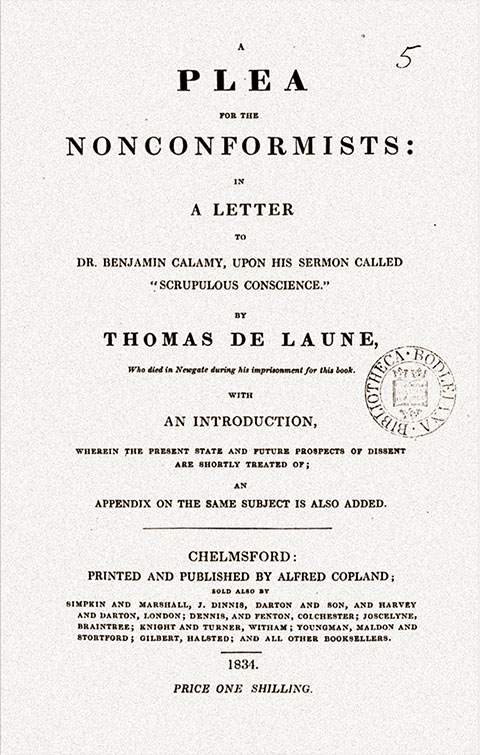
Where Protestants state churches existed, Protestants persecuted Protestants who differed from the official theology. The account of De Laune shows how bad it could get. Doctor Calamy preached a sermon, in which he invited Non-Conformists to show their reasons for dissenting from the Church of England. Thomas De Laune, a notable scholar, took up Calamy’s challenge and penned A Plea for the Nonconformists. He quoted arguments by several Church of England divines explaining why they rejected Roman Catholicism. He showed that the exact same arguments were held by Dissenters (Non-Conformists) in their rejection of the Church of England.
He pointed out the disconnect between Church of England writers who argued against Catholic persecution as “anti-christian, wolfish, and beastly, wholly contrary to Christianity and the lamb-like nature of Christ” but then turned around and persecuted Protestants who held different views from themselves. De Laune’s peaceable work, which asked only to be allowed to worship according to conscience, met a hostile and fateful reception.
De Laune was seized and imprisoned, charged with “contriving and intending to disquiet and disturb the peace and common tranquillity of this kingdom of England, &c.; to bring our said Lord the King into the greatest hate and contempt of his subjects; machining and farther intending to move, stir up, and procure, sedition and rebellion, and to disparage and scandalize the Book of Common Prayer, &c, by force and arms, &c; having unlawfully, seditiously, and maliciously written, printed, and published, and caused to be written, printed, and published, a certain false, seditious, and scandalous libel, of and concerning our said Lord the King, and the Book of Common Prayer, aforesaid, intitled A Plea for the Nonconformists.“
Fined more money than he could raise, he was held in Newgate. His wife and children joined him in prison. The foul air of the place combined with hunger to kill his family. Six weeks after the last of them died, De Laune also died.
Here is an excerpt from his Plea.
Thus, Sir, you have something which the Dissenters have to say for themselves, hoping it shall not be judged either unreasonable or unseasonable to present to you this their just defence, and give you thus the merits of the cause, not only from your call so to do, (and a silence thereupon might either bespeak consenting guilt, or prevent a satisfying reply to our conscientious scruples,) but also the many severe pressures and sufferings we lie under from you for our nonconformity, which may plead some excuse for this modest plea; and losers being admitted the liberty of speech, as sick men to groan, and the afflicted to cry; therefore may we not hope for a fair admission of our plaint for present, as better usage for the future, since we have not to do with savage Indians; but with our own countrymen, neighbours, fellow-citizens, acquaintance, relations, gentlemen, scholars; with men professing the same protestant religion with ourselves, and with so many who have offered reasons and arguments to us, and may therefore hope they will receive it from us,(how else can they answer our scruples,) and not stop our mouths with gaols, pillories, and halters, (say what they please to render us and our principles obnoxious, and refuse and reject our just defence, it being below common ingenuity to challenge an adversary to the field, and when he appears, cause him to be disarmed, gagged, and bound, and then manfully cudgel him, and boast of a conquest—far be it from us so to think,) and particularly since you yourselves lie under the same censure of schism, heresy, and sedition, from the popish party, as we from you, and have given the same arguments to justify your separation from them, as we from you, so that there wants nothing but demonstration, candour, and charity to set all honest protestants to rights.
